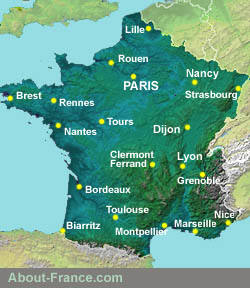French grammar
When to use the subjunctive in French
► To
conjugate verbs in the subjunctive, see Subjunctive
verb tables
The subjunctive is used in French in a number of quite common circumstances. Generally speaking, the subjunctive is used in dependent clauses following expressions that imply doubt, emotion, subjectivity, or conjecture.
After many verbs expressing fear, doubt or negative feelings, and after avant que, the verb in the dependent clause is preceded by "ne" (the "ne explétif"); this is not a marker of negation.
See examples 2, 4 & 10 below.
The main uses of the subjunctive are:
► 1. In complement clauses after Il faut que..... Example: Il faut que tu viennes !In this case, the subjunctive adds a note of uncertainty; even if the action is seen to be essential, the speaker - by saying il faut que - is admitting that there is some doubt.
Examples 1 & 2 below.
► 2. In complement clauses after some other verbs expressing doubt, opinion, hope, fear or another emotion.
Examples: Je doute qu'il soit là. J'apprécies que tu sois là. Je crains que nous ne soyons en retard. Je regrette que tu ne me l'aies pas dit.
Examples 3 - 7 below.
► 3. In subordinate clauses following certain conjunctions expressing an aim or a condition: afin que, de (telle) sorte que, pour que, bien que, quoique, pour autant que, malgré que, pourvu que, à condition que, de crainte que, avant que, après que and a few other less common conjunctions.
Examples 8 - 11 below.
► 4. As a third person imperative: Example: Que personne ne bouge !
Example 12 below.
► 5. In relative clauses after superlative adjectives and the adjectives premier, dernier and seul.
Examples 13 & 14 below.
Examples:
1.
Il faut qu'il finisse avant ce soir
He'll have to finish before this evening2. Il faut que nous ayons tout
nettoyé
avant qu'il ne soit
de retour.
We'll have to have
finished cleaning everything before he gets back.3.
Elle voudrait que je vende la maison !!.
She'd
like me to sell the house !! (hope)4.
Nous craignons que nous ne soyons en retard.
We're
afraid we may be late. (fear)5. Je m'oppose à ce qu'il vienne.
I object to him coming.
(opinion)6. Il est tout
à fait normal que les touristes soient tous partis.
It's quite normal that the tourists have
gone away. (opinion)7. Il
se peut que tu aies eu raison .
You may
have been right (uncertainty)8.
Je mis le champagne au frigo afin qu'il soit frais.
I've put the champagne in the fridge so
that it's cool. 9.
Bien qu'il soit minuit, personne n'est encore sorti.
Although
it's midnight, no-one's come out yet.
10. Pose
tout ça avant que tu ne casse quelque chose !
Put all
that down before you break something !11.
Pour autant que je sache, ce sont des règles
européens
As far as
I know, the're European rules.12.
Que personne ne touche à quoi que ce soit !
No-one
touch anything.13. C'est la seule bière qu'il
boive.
It's the
only beer he drinks.14.
C'est le plus grand poisson qu'il ait jamais attrapé!
It's the biggest fish he's ever caught.15.
Il se peut qu'elle ait été vue !
She may have been seen.► 6. Special case: verbs implying certainty in the affirmative, doubt in the negative.
Example: penser
In the affirmative, the French verb penser expresses a firm opinion: the dependent clause does not therefore normally have a verb in the subjunctive.
Examples: Je pense que je serai là. Je pense qu'il est mort.
However, in the negative, penser implies uncertaintly, and this is commonly reflected in the use of the subjunctive tense in the dependent clause:
Example: Je ne pense pas qu'il puisse le faire. Je ne pense pas qu'il soit mort
Hovever, while this is considered good French, many speakers and writers in France would use an indicative tense, as in:
Je ne pense pas qu'il pourra le faire. / Je ne pense pas qu'il est mort.
Some similar verbs or expressions:
croire que, dire que (when expressing opinion)
être certain / sûr / exact / clair / vrai que,
vouloir dire que
Examples:
1.
Je crois qu'il viendra
I think he'll come.2.
Je ne crois pas qu'il vienne.
I don't think he'll
come.
3. Il est clair que nous avons
déjà perdu
It's
clear that we've already lost.4.
Il n'est pas clair que nous ayons délà perdu.
It's not
clear that we've already lost5. Ca veut dire qu'il a gagné son
procès.
That means he's won his lawsuit.6. Ca ne veut pas
dire qu'il ait gagné son procès..
That doesn't mean he's won his lawsuit.Essential French words and phrases for travellers
25 essential words and 25 vital phrases



